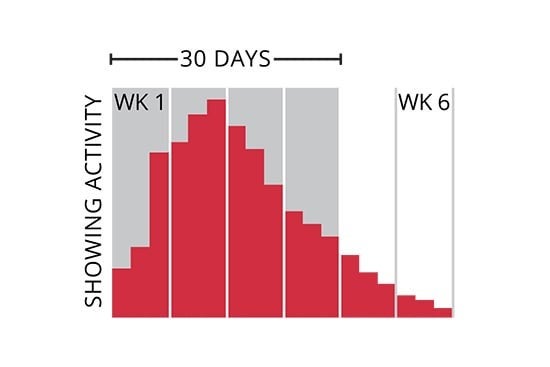
What Is Market Rot
You list your home and you anxiously await an offer. Showings are sporadic. Thirty days go by, then sixty then ninety. Then you pass the average days on the market in your area. It starts to become obvious to you that your house is not selling and now you are getting worried. The days on market (DOM) is the amount of time from the day you list a property until the day you take your house off the market due to an accepted offer. Rule of thumb, in a balanced market, is you should receive an offer in 8-12 showings and those showings should occur in the first two weeks on the market. This is assuming the home is accurately priced and properly presented. While your house sits on the market longer and longer, typically showings become less and less or almost non-existent.
When your house is not selling you will experience Market Rot!
What is market rot? I heard an agent use this term a long time ago and it is so fitting. Market rot occurs when your house is sitting on the market unsold. The longer your house sits the more stagnant or rotten it gets. Think of it this way…. when you go to the store and buy bananas, you usually buy them slightly green, they reach their peak in a few days and as they sit on your counter, they get a little browner as the days go by. Eventually, if they go uneaten, they are so rotten you must throw them away. No one wants the rotten bananas. Not unlike what happens to bananas, buyers of your home will perceive your home as stagnating or rotting on the market the same way. When your home is new to the market, buyers will initially perceive it as fresh and exciting…. maybe this is the one. They are afraid to miss out on an opportunity. As time goes on and your house is not selling, they become less excited about it. The buyer's attitude becomes it has not sold, it will be here next week and I will look around and see if I like something better. The urgency is now gone. Eventually, you will reach a point where buyers wonder what is wrong with your house because it has not sold. It will get to a point where they will not even want to look at it because no one else wants it and why should they?
The life cycle of a house sitting on the market
The graphic below is what happens to showing activity the longer and longer a house sits on the market. This pattern will repeat itself in showings as well as online viewings on various websites. Essentially, the graph is illustrating showing activity is high coming out of the gate and then tapers off as time goes on.
The Number One Reason Your House is Rotting on the Market!

The Number One Reason Your House is Rotting on the Market!
So, your house is not selling and literally “rotting” on the market as perceived by buyers….why? The number one reason your house is experiencing market rot is it is overpriced. Right now in today’s market, if you overprice even 3-5% over fair market value, your house can possibly sit, rotting on the market. Yes, you will get activity, but eventually it will dwindle to a trickle.
· No amount of marketing will sell an overpriced home.
· It is almost impossible to under price a home. If you're slightly under price buyers will bid up a good property. It will attract far more buyers and showings. Increased activity will generally attract buyers and create competition.
· Proper pricing turns the tables on the buyers, instead of sellers competing for buyers’ attention, buyers are now competing for the home!
The first two weeks are considered the most crucial period for setting up a successful sale. Immediately after you list your home, it’s top of mind—for both the agents who see it on the multiple listing service (MLS) and the buyers who find it online. A fresh listing can generate a lot of excitement, but that excitement is bound to drop off (usually around the two-week mark). What the data shows is that a property that sells quicker, sells for more money than homes that sit on the market. Selling a home in the first two weeks, will probably net you about 3% to 5% more than homes that sit on the market for over 60 days. On top of it the longer you sit on the market there is a chance your home will go unsold!! Besides saving time and money there are other reasons to price your house properly.Some Ways to Avoid Market Rot
- Hire an experienced agent- An experienced agent will know how to counsel you and price your home properly. They will counsel you on how to properly price your home and keep you informed of market changes and other sales.
- Review and understand the data yourself- Review the data yourself that your agent provides you. Does the data make sense? Again, it's your decision what to list the house for and how to interpret the information.
- Do not get into the trap of thinking asking more will net you more - Yes that is certainly human nature. I can provide valid data for you to review but it is ultimately your choice to set the listing price. I have had sellers say, yes, they understand but they want to leave bargaining room or worse yet…. I want to try and let them make an offer. Understand that many buyers will walk away and not make an offer even if they like your home if you are overpriced. They do not want to get involved in a process they do not believe will have a good outcome.
- Make your home available for showings- Yes you have to show it to sell it. Do not deny every other showing because it's inconvenient. Guess what? Selling a home is inconvenient at times.
- Put your home in tip-top showing condition- Clean, de-clutter, freshen paint and clean some more!! If you can, do some of the small repairs that need to be done. A home that shows well will also photograph well and attract buyers online. Your house may need a new kitchen or could use a little TLC. Maybe you do not have money to fix it up but you can certainly paint, declutter, and clean.
Of course, there are things that you can fix or change, but there are some objections that can only be overcome with a price adjustment. A house can easily be cleaned or de-cluttered if it is distracting to buyers. But a house that backs up to the highway cannot be moved. I have noticed over the years, that feedback like the house is too small or the highway is in the backyard, goes away as the home starts to be priced more in line with what will attract the right buyer.
At the end of the day, take the time to understand the comparable properties to yours, understand the market you are in today and not yesterday, and price it right. It will save you months of aggravation as well as putting more money in your pocket.
